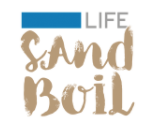Natural-based solutions to mitigate flood risk due to sand boils reactivations along the Po river

LIFE SandBoil is a project coordinated by the Department of Civil, Chemical, Environmental and Materials Engineering (DICAM) of the University of Bologna (Italy) and funded by the European Community within the LIFE program. Three other partners (the Interregional Agency for the Po River (AlPo), Officine Maccaferri Italia srl, and the North-Transdanubian Water Directorate (ÉDUVIZIG)) contribute to the implementation of the project.
This project aims at developing an innovative, sustainable, natural-based, and cost-effective engineering solution for the mitigation of the backward erosion piping risk in river embankments. Backward erosion piping is a type of internal erosion process in which pipes are created in the sandy aquifer underlying a water-retaining structure, such as a dam or a river embankment, as a result of the removal and transport of soil particles by seepage pressures. The onset and progression of the phenomenon is typically revealed by the occurrence on the ground surface of the so-called sand boils, hence the acronym of the project.
In Italy, over the last years, a total of 130 sand boils have been cataloged along the river Po. Most of them have been mapped in the main course of the river and suffer from recurrent reactivations during high water events, whereas those located in the delta area reactivate also at relatively moderate levels, therefore, the mitigation of this phenomenon is a major concern.
The LIFE SandBoil final goal is to develop a complete and qualified market-ready technology, intended to stop the progression of the erosion process beneath river embankments susceptible to piping and suitable for large-scale implementation.
The LIFE SandBoil project includes a number of actions devised to develop a complete and qualified system for the mitigation of backward erosion piping beneath river embankments as well as to promote the technology for its future extensive implementation worldwide in different river basins affected by piping phenomena.
The main actions of the project can be classified as follows:
Data collection and analysis of backward erosion piping evidence in Italy and Hungary for reproductive purposes.
Realization and validation of the prototype through a multi-step process.
The project includes the implementation of the final system prototype in a fully operational environment, which is planned to be replicated in two critical sites of the Danube river basin.
Dissemination of the project results for the successful transferability and replicability of the proposed mitigation technology with intense dissemination addressed to the Authorities and public bodies responsible for flood risk management and masters degree and PhD students.
Networking relationships and collaborations with other stakeholders exchange information with other LIFE projects or other European projects.
Project Budget: 1 552 062 EUR (LIFE)
Project Duration: 01/10/2020 – 30/09/2025
Project Partners: 4
Lead Partner: Department of Civil, Chemical, Environmental and Materials Engineering of the University of Bologna (IT)


